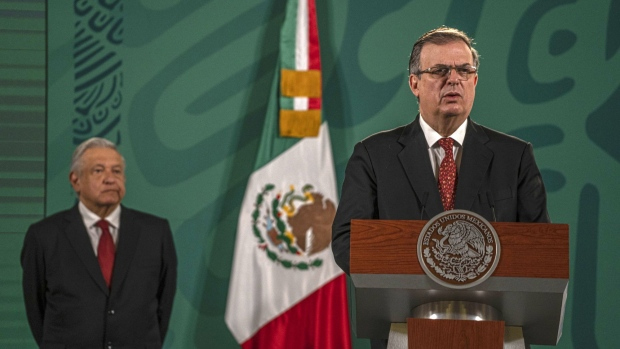
Mexico keen to stop as many issues as possible going to panel / Politically unfeasible for Mexico to change laws at US behest.
Max de Haldevang, Maya Averbuch and Eric Martin, Bloomberg News
MEXICO CITY
EnergiesNet.com 08 05 2022
Foreign Affairs Minister Marcelo Ebrard and Economy Minister Tatiana Clouthier, two of the Mexican government’s most senior officials, are leading a team working to resolve the trade dispute filed by the US and Canada.
The group of six key government figures is seeking to prevent the case from going into potentially costly arbitration, according to people familiar with the country’s strategy who asked not to be named discussing internal policy.
Mexico’s North American neighbors lodged the complaint last month against the nationalist energy policy of the government of President Andres Manuel Lopez Obrador, arguing that it discriminates against US and Canadian companies trying to operate in the Latin American country. According to the rules of their 2020 trade agreement, known as USMCA, within 30 days of the filing officials will start holding talks as a first stage in the process to settle the dispute.
The team underscores Lopez Obrador’s keenness to find a negotiated solution. After making the revival of Mexico’s state-owned energy companies a pillar of his government, he is now enlisting two of his most pro-business cabinet members to resolve the dispute.
The countries have 75 days to come to an agreement on the dispute before going into arbitration panels, although that negotiation period could be extended with the agreement of all parties.
The people familiar with the matter said Mexico is keen to stop as many of the complaints as possible going into that second stage, which could potentially have a high economic cost. If panels ruled against Mexico, it may have to pay tariffs on as much as $30 billion in exports, former officials who negotiated the agreement told Bloomberg News last month.
The stage of talks is “important” because dispute resolution panels are a “zero-sum game” in which “you can win everything or lose everything,” Ebrard said in a statement last week.
The Foreign Affairs Ministry had no further comment for this article. Press officials for Mexico’s presidency and Economy Ministry didn’t immediately reply to requests for comment.
Mexico Team
Mexico’s team also includes the Foreign Ministry’s North America chief Roberto Velasco and Deputy Economy Minister Luz Maria de la Mora. The other two officials are technical experts.
While it would be politically unfeasible for the Lopez Obrador administration to accept changing the country’s recent energy laws at the US and Canada’s behest, the government is focusing on resolving individual cases with American and Canadian companies in an effort to try to dissipate the dispute, one of the people said.
Lopez Obrador’s public response has been a pugnacious vow to defend Mexico’s sovereignty but behind the scenes Mexico is making a real effort to understand and address the US and Canada concerns, another person familiar with his strategy said. The president can be pragmatic and, if given a chance for a face-saving exit, he could take measures to soften rules to address the concerns, the person said, also asking for anonymity.
Clouthier last week sent a letter to Rocio Nahle, the Energy Minister executing Lopez Obrador’s nationalistic policies for the industry, to request technical support to “formulate solutions” that could appease the country’s trade partners, according to a copy of the missive seen by Bloomberg News.
Since taking power in late 2018, Lopez Obrador has moved to reverse the opening to private and foreign investment in the energy sector approved almost a decade ago, giving state oil giant Petroleos Mexicanos and the nation’s utility renewed control over the industry.
bloomberg.com 08 04 2022












